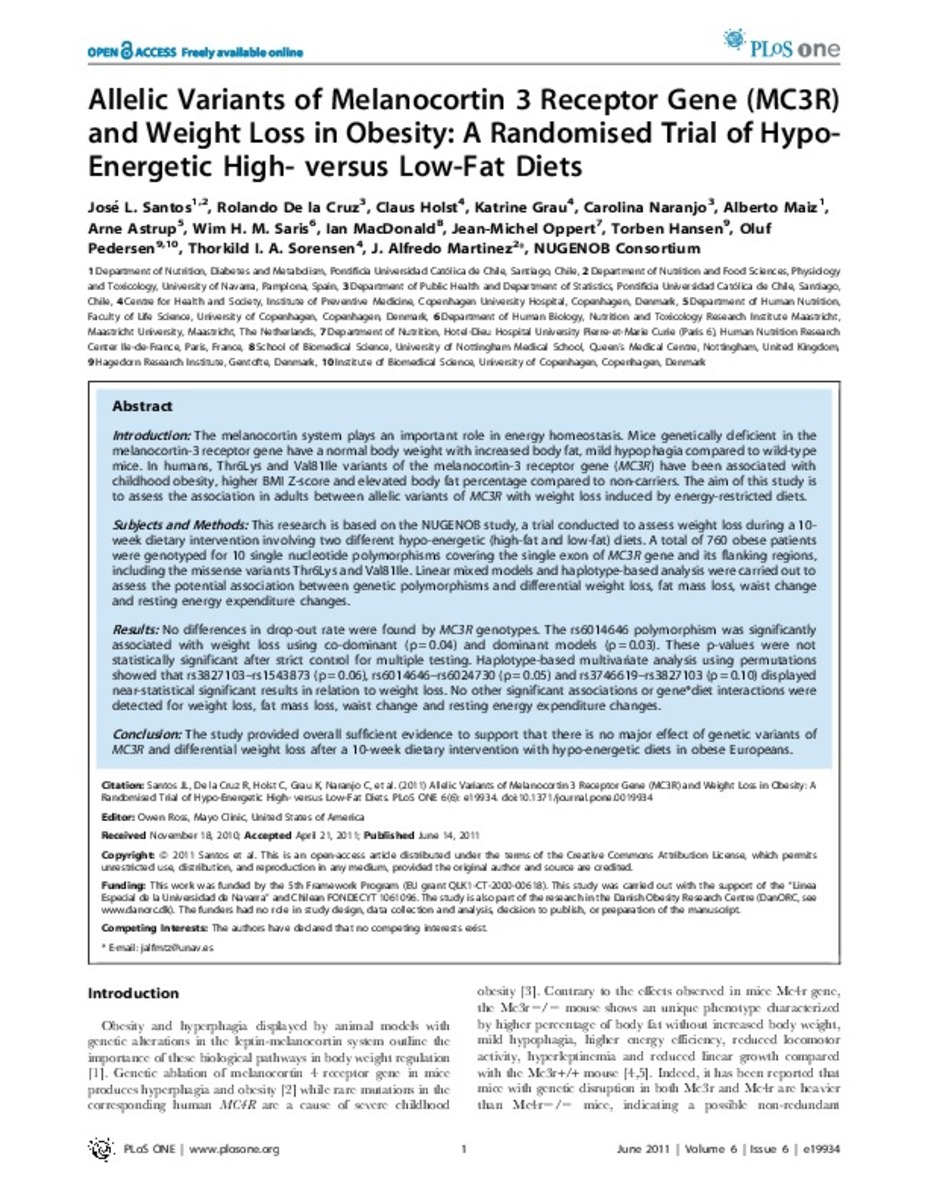Full metadata record
| DC Field | Value | Language |
|---|---|---|
| dc.creator | Santos, J.L. (José Luis) | - |
| dc.creator | Cruz, R. (R.) de la | - |
| dc.creator | Holst, C. (C.) | - |
| dc.creator | Grau, K. (K.) | - |
| dc.creator | Naranjo, C. (C.) | - |
| dc.creator | Maiz, A. (Alberto) | - |
| dc.creator | Astrup, A. (Arne) | - |
| dc.creator | Saris, W.H.M. (Wim H. M.) | - |
| dc.creator | MacDonald, I. (Ian) | - |
| dc.creator | Oppert, J.M. (Jean M.) | - |
| dc.creator | Hansen, T. (Torben) | - |
| dc.creator | Pedersen, O. (Oluf) | - |
| dc.creator | Sørensen, T.I.A (Thorkild I. A.) | - |
| dc.creator | Martinez, J.A. (José Alfredo) | - |
| dc.date.accessioned | 2013-03-22T12:28:20Z | - |
| dc.date.available | 2013-03-22T12:28:20Z | - |
| dc.date.issued | 2011 | - |
| dc.identifier.citation | Santos JL, De la Cruz R, Holst C, Grau K, Naranjo C, Maiz A, et al. Allelic variants of melanocortin 3 receptor gene (MC3R) and weight loss in obesity: a randomised trial of hypo-energetic high- versus low-fat diets. PLoS One 2011 JUN 14;6(6):e19934. | es_ES |
| dc.identifier.issn | 1932-6203 | - |
| dc.identifier.uri | https://hdl.handle.net/10171/28170 | - |
| dc.description.abstract | INTRODUCTION: The melanocortin system plays an important role in energy homeostasis. Mice genetically deficient in the melanocortin-3 receptor gene have a normal body weight with increased body fat, mild hypophagia compared to wild-type mice. In humans, Thr6Lys and Val81Ile variants of the melanocortin-3 receptor gene (MC3R) have been associated with childhood obesity, higher BMI Z-score and elevated body fat percentage compared to non-carriers. The aim of this study is to assess the association in adults between allelic variants of MC3R with weight loss induced by energy-restricted diets. SUBJECTS AND METHODS: This research is based on the NUGENOB study, a trial conducted to assess weight loss during a 10-week dietary intervention involving two different hypo-energetic (high-fat and low-fat) diets. A total of 760 obese patients were genotyped for 10 single nucleotide polymorphisms covering the single exon of MC3R gene and its flanking regions, including the missense variants Thr6Lys and Val81Ile. Linear mixed models and haplotype-based analysis were carried out to assess the potential association between genetic polymorphisms and differential weight loss, fat mass loss, waist change and resting energy expenditure changes. RESULTS: No differences in drop-out rate were found by MC3R genotypes. The rs6014646 polymorphism was significantly associated with weight loss using co-dominant (p = 0.04) and dominant models (p = 0.03). These p-values were not statistically significant after strict control for multiple testing. Haplotype-based multivariate analysis using permutations showed that rs3827103-rs1543873 (p = 0.06), rs6014646-rs6024730 (p = 0.05) and rs3746619-rs3827103 (p = 0.10) displayed near-statistical significant results in relation to weight loss. No other significant associations or gene*diet interactions were detected for weight loss, fat mass loss, waist change and resting energy expenditure changes. CONCLUSION: The study provided overall sufficient evidence to support that there is no major effect of genetic variants of MC3R and differential weight loss after a 10-week dietary intervention with hypo-energetic diets in obese Europeans. | es_ES |
| dc.language.iso | eng | es_ES |
| dc.publisher | Public Library of Sciences | es_ES |
| dc.rights | info:eu-repo/semantics/openAccess | es_ES |
| dc.subject | Genome wide association | es_ES |
| dc.subject | Childhood obesity | es_ES |
| dc.subject | Eating behavior | es_ES |
| dc.subject | Food intake | es_ES |
| dc.subject | Body fat | es_ES |
| dc.subject | Polymorphisms | es_ES |
| dc.subject | Insulin | es_ES |
| dc.subject | Mutations | es_ES |
| dc.title | Allelic variants of melanocortin 3 receptor gene (MC3R) and weight loss in obesity: a randomised trial of hypo-energetic high- versus low-fat diets | es_ES |
| dc.type | info:eu-repo/semantics/article | es_ES |
| dc.type.driver | info:eu-repo/semantics/article | es_ES |
| dc.identifier.doi | http://dx.doi.org/10.1371/journal.pone.0019934 | es_ES |
Files in This Item:
Statistics and impact
Items in Dadun are protected by copyright, with all rights reserved, unless otherwise indicated.






